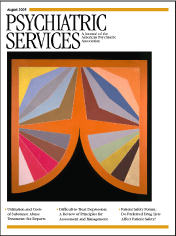To the Editor: In their March Taking Issue commentary, Brown and Tucker (
1) argue that "in light of findings that the course of schizophrenia is, in most instances, considerably more favorable than had been previously thought, a consensus has emerged that the appropriate goals for treatment are recovery and reintegration."
We are baffled as to what findings the authors are referring to. Much has been made of the potential benefits of the newer antipsychotics, and at the very least these medications have advanced the field by rejuvenating interest in the study of the pathophysiology and treatment of schizophrenia. However, to say that the progress that has been made permits us to begin talking about recovery is simply overstating the case.
We are now hearing this term more frequently applied to schizophrenia, in this journal as well as elsewhere (
2). However, a review of clinical advances seen over the past decade provides less than compelling evidence in support of this position. For example, a well-publicized meta-analysis concluded that the improvement observed in the treatment of positive and negative symptoms is modest at best (
3). A more recent meta-analysis of the purported neuropsychological benefits of the newer antipsychotics drew a similar conclusion—"it is highly unlikely that the gains will be sufficient to return patients to the vocational level predicted from their individual premorbid status" (
4). Further evidence for the limitations of existing treatment can be found in recently published data indicating that less than 15 percent of individuals meet criteria for recovery at five years after a first episode of psychosis (
5).
Schizophrenia and its outcomes are heterogeneous, and it is imperative that we maintain optimism as we undertake treatment of affected individuals. Gains have been made with the newer antipsychotics, but to suggest that the magnitude of these allow us to now embrace "recovery" as the appropriate goal is a blatant misinterpretation of existing evidence. Such a position may invoke hope, but it is deceiving to people with schizophrenia and their families, because it suggests that we somehow now have the knowledge and tools to make this happen on a routine basis. Could it be that this newfound discussion of recovery is being driven by the pharmaceutical industry, in the same fashion that the industry characterized the limited neurocognitive benefits of certain antipsychotics as a substantive gain in order to market these medications in recent years?

